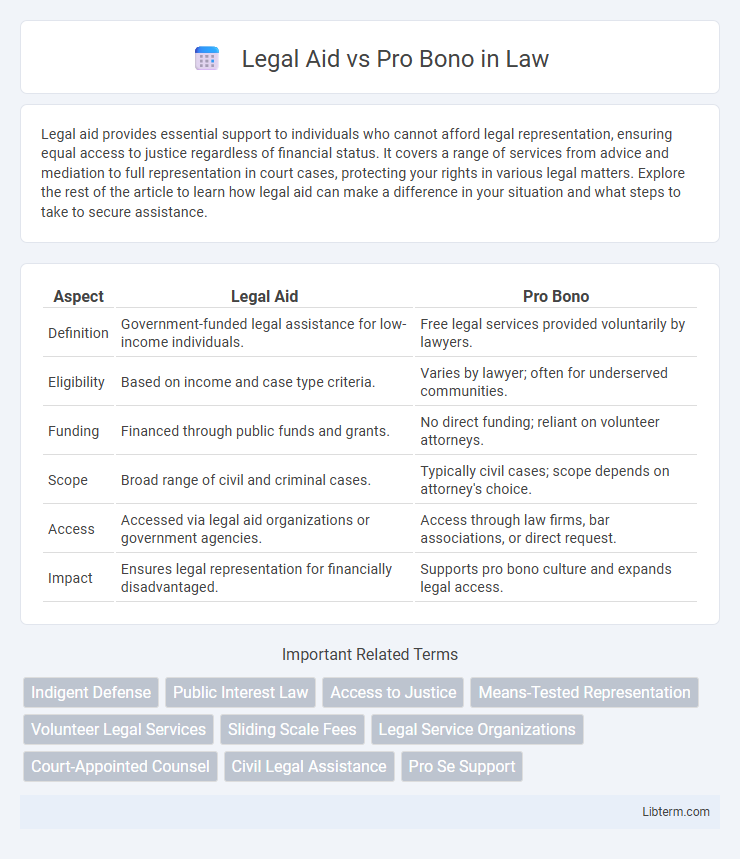Legal aid provides essential support to individuals who cannot afford legal representation, ensuring equal access to justice regardless of financial status. It covers a range of services from advice and mediation to full representation in court cases, protecting your rights in various legal matters. Explore the rest of the article to learn how legal aid can make a difference in your situation and what steps to take to secure assistance.
Table of Comparison
| Aspect | Legal Aid | Pro Bono |
|---|---|---|
| Definition | Government-funded legal assistance for low-income individuals. | Free legal services provided voluntarily by lawyers. |
| Eligibility | Based on income and case type criteria. | Varies by lawyer; often for underserved communities. |
| Funding | Financed through public funds and grants. | No direct funding; reliant on volunteer attorneys. |
| Scope | Broad range of civil and criminal cases. | Typically civil cases; scope depends on attorney's choice. |
| Access | Accessed via legal aid organizations or government agencies. | Access through law firms, bar associations, or direct request. |
| Impact | Ensures legal representation for financially disadvantaged. | Supports pro bono culture and expands legal access. |
Introduction to Legal Aid and Pro Bono Services
Legal Aid provides low-income individuals with access to legal representation through government-funded programs, ensuring justice regardless of financial status. Pro Bono services involve voluntary legal assistance offered by private attorneys or law firms to clients unable to afford standard fees. Both Legal Aid and Pro Bono work aim to bridge the justice gap, but differ in their funding sources and organizational structures.
Defining Legal Aid: Scope and Eligibility
Legal Aid provides government-funded legal services primarily for low-income individuals facing civil, criminal, or family law issues, with strict eligibility criteria based on income, assets, and case type. It covers comprehensive legal representation, advice, and assistance designed to ensure access to justice for marginalized populations. Eligibility requirements often include income thresholds and case merit reviews to allocate resources effectively within the public legal aid system.
Understanding Pro Bono Legal Work
Pro bono legal work involves attorneys providing free legal services to clients who cannot afford representation, often supported by law firms, bar associations, or nonprofit organizations. This voluntary commitment helps bridge gaps in access to justice, addressing issues such as civil rights, family law, and housing disputes. Unlike court-appointed legal aid, pro bono work emphasizes individual lawyer initiative and specialized expertise tailored to client needs.
Key Differences Between Legal Aid and Pro Bono
Legal Aid provides government-funded or nonprofit-supported legal services primarily to individuals with low income, ensuring access to justice through structured programs. Pro Bono services involve voluntary legal assistance offered by private attorneys or firms without charge, often targeting underserved communities or specific causes. The key difference lies in Legal Aid's institutional funding and eligibility criteria versus Pro Bono's voluntary nature and broader discretionary service scope.
Funding Sources for Legal Aid vs Pro Bono
Legal Aid is primarily funded by government grants, charitable organizations, and public funds to provide low-income individuals access to legal services. Pro Bono services rely on voluntary contributions from private law firms, individual attorneys, and professional associations without direct funding sources. While Legal Aid programs have structured budgets and accountability for funding, Pro Bono work depends on the goodwill and time commitment of legal professionals.
Types of Legal Issues Handled
Legal aid primarily handles civil matters such as family law, housing disputes, and public benefits claims, targeting low-income individuals eligible for government-funded services. Pro bono work often spans a broader range of cases, including complex criminal defense, immigration, and nonprofit organization support, provided voluntarily by private attorneys regardless of client income. Both services address access to justice but differ in scope, funding, and client eligibility criteria.
Who Can Benefit from Each Service?
Legal aid primarily benefits low-income individuals and families who meet specific financial eligibility criteria, providing access to essential legal services in civil, criminal, and family law matters. Pro bono services are often available to those who may not qualify for legal aid but cannot afford standard legal fees, including nonprofit organizations and community groups. Both services aim to increase access to justice, targeting underserved populations with limited financial resources.
Challenges Faced by Legal Aid and Pro Bono Providers
Legal aid providers often struggle with limited funding, high caseloads, and resource constraints that impact their ability to offer comprehensive legal services. Pro bono attorneys face challenges such as time limitations, lack of specialized training, and balancing unpaid work with regular caseloads. Both legal aid and pro bono services must navigate systemic barriers, including complex client needs and inconsistent access to court resources.
Impact on Access to Justice
Legal Aid programs provide structured government-funded support, significantly expanding access to justice for low-income individuals by covering legal representation costs. Pro Bono services, offered voluntarily by private attorneys, fill critical gaps in legal assistance but often lack consistency and reach, limiting their overall impact. Combining both approaches enhances access to justice by increasing legal resource availability across diverse populations facing economic barriers.
Choosing the Right Legal Support Option
Legal aid provides government-funded legal services to low-income individuals, ensuring access to justice through qualifying criteria and structured programs. Pro bono work involves voluntary legal assistance offered by lawyers or law firms without charge, often focusing on specific cases or communities in need. Choosing the right legal support depends on eligibility, case complexity, and urgency, with legal aid suited for broad, ongoing support and pro bono ideal for targeted, specialized help.
Legal Aid Infographic

 libterm.com
libterm.com